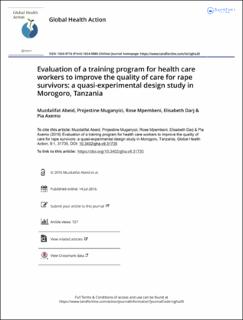| dc.contributor.author | Abeid, Muzidalifat | |
| dc.contributor.author | Muganyizi, Projestine | |
| dc.contributor.author | Mpembeni, Rose | |
| dc.contributor.author | Darj, Elisabeth | |
| dc.contributor.author | Axemo, Pia | |
| dc.date.accessioned | 2020-04-30T13:23:39Z | |
| dc.date.available | 2020-04-30T13:23:39Z | |
| dc.date.created | 2016-11-16T10:40:08Z | |
| dc.date.issued | 2016 | |
| dc.identifier.citation | Global Health Action. 2016, 9 (1) | en_US |
| dc.identifier.issn | 1654-9716 | |
| dc.identifier.uri | https://hdl.handle.net/11250/2653088 | |
| dc.description.abstract | Background
Sexual violence against women and children in Tanzania and globally is a human rights violation and a developmental challenge.
Objective
The aim of this study was to assess the impact of training health professionals on rape management. The specific objectives were to evaluate the changes of knowledge and attitudes toward sexual violence among a selected population of health professionals at primary health care level.
Design
A quasi-experimental design using cross-sectional surveys was conducted to evaluate health care workers’ knowledge, attitude, and clinical practice toward sexual violence before and after the training program. The study involved the Kilombero (intervention) and Ulanga (comparison) districts in Morogoro region. A total of 151 health professionals at baseline (2012) and 169 in the final assessment (2014) participated in the survey. Data were collected using the same structured questionnaire. The amount of change in key indicators from baseline to final assessment in the two areas was compared using composite scores in the pre- and post-interventions, and the net intervention effect was calculated by the difference in difference method.
Results
Overall, there was improved knowledge in the intervention district from 55% at baseline to 86% and a decreased knowledge from 58.5 to 36.2% in the comparison area with a net effect of 53.7% and a p-value less than 0.0001. The proportion of participants who exhibited an accepting attitude toward violence declined from 15.3 to 11.2% in the intervention area but increased from 13.2 to 20.0% in the comparison area.
Conclusions
Training on the management of sexual violence is feasible and the results indicate improvement in healthcare workers’ knowledge and practice but not attitudes. Lessons learned from this study for successful replication of such an intervention in similar settings require commitment from those at strategic level within the health service to ensure that adequate resources are made available. | en_US |
| dc.language.iso | eng | en_US |
| dc.publisher | Taylor & Francis | en_US |
| dc.rights | Navngivelse 4.0 Internasjonal | * |
| dc.rights.uri | http://creativecommons.org/licenses/by/4.0/deed.no | * |
| dc.title | Evaluation of a training program for health care workers to improve the quality of care for rape survivors: a quasi-experimental design study in Morogoro, Tanzania | en_US |
| dc.type | Peer reviewed | en_US |
| dc.type | Journal article | en_US |
| dc.description.version | publishedVersion | en_US |
| dc.source.volume | 9 | en_US |
| dc.source.journal | Global health action | en_US |
| dc.source.issue | 31735 | en_US |
| dc.identifier.doi | 10.3402/gha.v9.31735 | |
| dc.identifier.cristin | 1400911 | |
| dc.description.localcode | © 2016 Muzdalifat Abeid et al. This is an Open Access article distributed under the terms of the Creative Commons CC-BY 4.0 License (http://creativecommons.org/licenses/by/4.0/), allowing third parties to copy and redistribute the material in any medium or format and to remix, transform, and build upon the material for any purpose, even commercially, provided the original work is properly cited and states its license. | en_US |
| cristin.ispublished | true | |
| cristin.fulltext | original | |
| cristin.qualitycode | 1 | |

